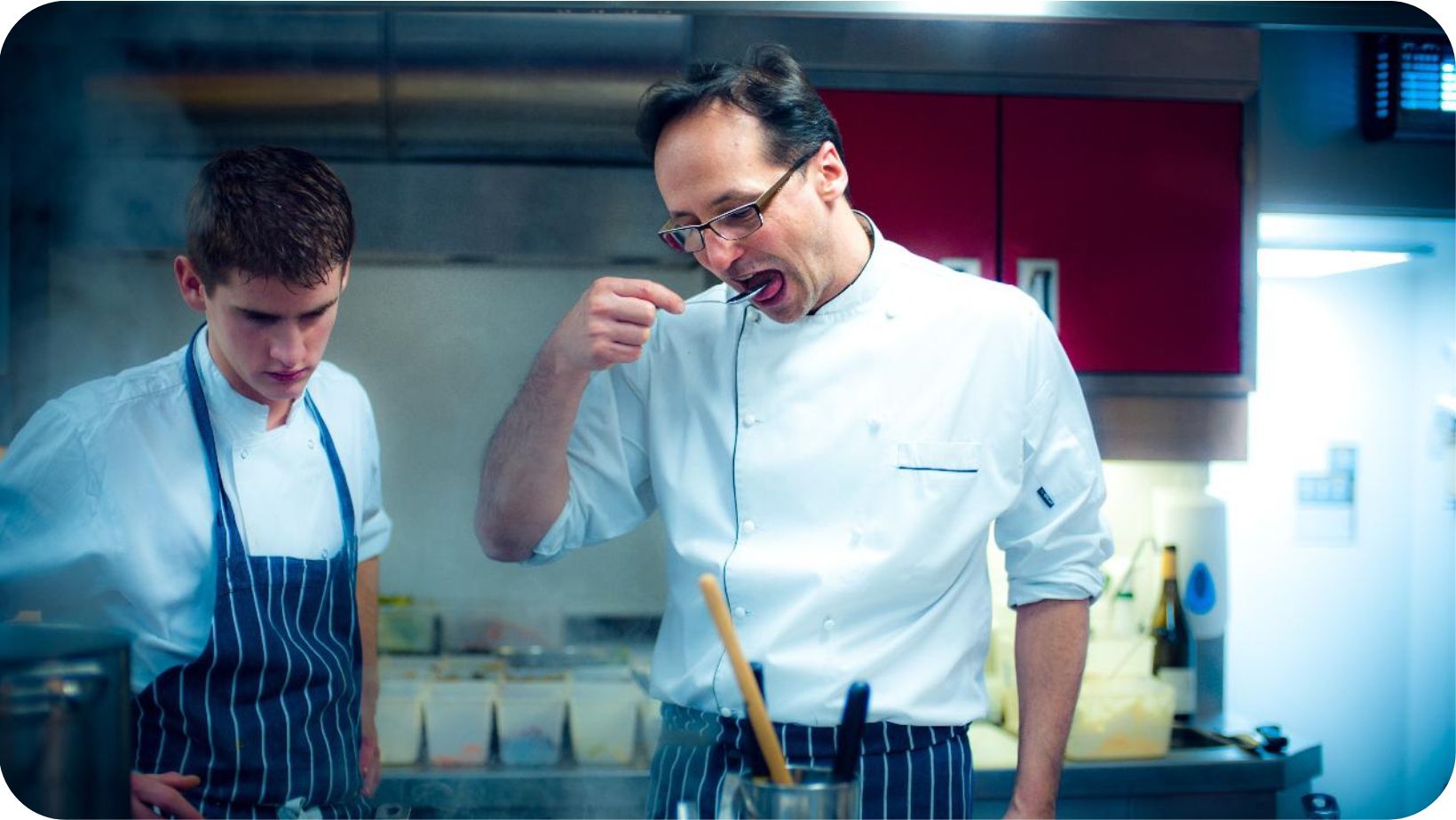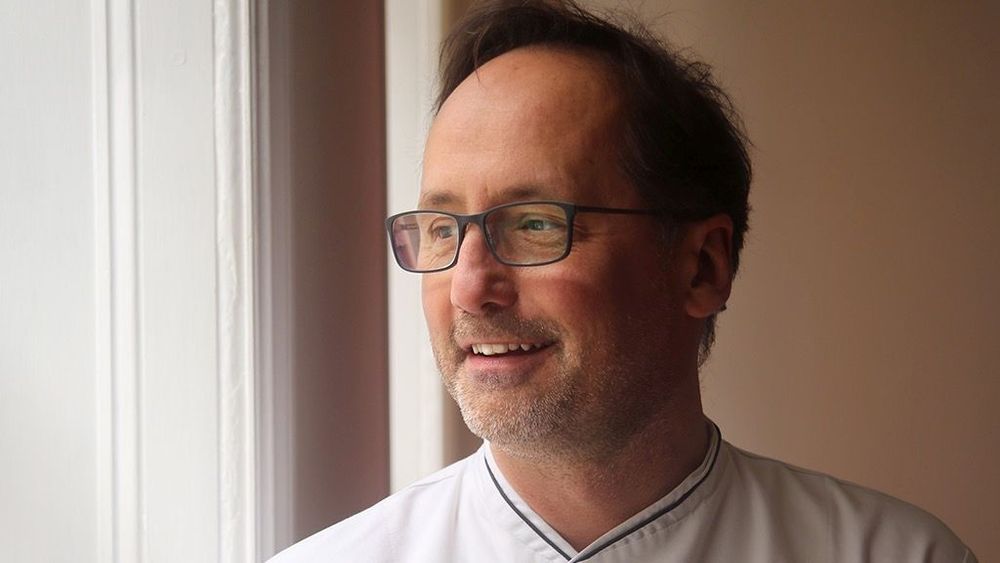One on one with Alexis Gauthier: It’s all about fine dining
If you are vegan and haven't heard of Alexis Gauthier over the last few years, this is your invitation to learn about a truly inspirational human being. A classically trained French gastronomic chef who, in an effort to establish a more sustainable and plant-based presence in the fine dining world, converted his London-based Michelin Star restaurant into the first completely vegan fine dining restaurant!
V-Land UK (V-L): What an absolute pleasure to meet you, Alexis! You made the bold and admirable decision in June 2021 to reopen Gauthier Soho, as the first French and fully vegan fine dining restaurant in the world. What motivated this choice?
Alexis Gauthier (AG): It was a process which had taken about five years: transforming my restaurant from an animal abuser profiting place, to somewhere where no animals were involved in the making of the meals. Many things happened! I’ve always been very much in love with vegetables, but that wasn’t enough. For many years, the majority of my cuisine was vegetables. In 2013 I released a book called Vegetronic with vegetables at the centre of the plate. However, I was still using animal products.
I happened to read the book Antispéciste. As a chef animal welfare was something I was always thinking about. When I finished the book, I knew I couldn’t carry on the way I was living my life. It would be impossible as a human being to continue profiting and contributing to all sorts of abuse and torment being inflicted on the world of animals. The day I closed the book was the day I stopped eating animal products. I haven’t eaten any since. It really was the catalyst.
I had a classical French gastronomic restaurant serving racks of lamb, scallops and lobster! So, I decided that firstly we are not going to create any new dishes involving animals. Removing them two by two, making dairy-free pastries then removing all the meat and fish. When we re-opened after COVID, the restaurant naturally became fully vegan and will never again serve animal products.
V-L: For our readers who may not know, the principle of ‘gastronomy’ is to create a unison of flavour and colour during the cooking process, contributing to a pleasant sensory experience at the dining table. What has been your biggest challenge creating a plant-based, French gastronomic experience?
AG: Well when I started, I thought it was going to be a massive challenge. What about everything I learned in the past? What about my French-ness in the world of gastronomy? For hundreds of years the invention of French gastronomy is all based around French techniques and ingredients! But thank God my vision has changed about it. I felt like I could retain all the knowledge I have learned, and put everything towards a creative future based on the French gastronomic spirit. But without animals. It was wonderful because you open so many avenues to create a new kind of gastronomy.
I’m in the middle of writing a big book about French vegan gastronomy, which I hope will be the book that every chef who has reached the same conclusion as I have can actually take it out and say “OK we can carry on being French and gastronomic.” It can be seen as discovering a new planet! It’s all ready to be written, which is why I feel chefs have a major role to play in our future. Creating delicious food more than anything, can help people realise they can live without eating animals.
V-L: You’ve gained a great deal of attention from both the meat-eating and vegan community for the pioneering of ‘faux-gras’, your plant-based alternative to the popular French delicacy ‘foie gras’. Is the culinary process of replicating dishes such as this, an easy one?
AG: No. It’s not easy because trying to recreate the richness of the animal fat is always a challenge. The fat from grains doesn’t linger as long as animal fat. This is when you realise that animal fat is really overpowering. Not as refined or rich as what you get from a grain for example. It took us a while to develop the recipes. We had to think really hard about how to add umami flavours at certain stages of the recipe, to recreate the richness for the faux-gras. It isn’t like sending someone to the moon, it's visible and we did it! Of course it’s not the same but it’s very close in terms of taste and the pleasure of eating it. It’s flavoursome, rich and beautiful. So, no need to have foie gras, you can have faux-gras!
V-L: The refined presentation of your dishes is simply stunning. What inspires their conception?
AG: My eyes are always one of my guests. I think about who the customers may be, sitting in front of the plate. Does it portray my inspiration? Does it encapsulate the season we are in? On your way to the restaurant in the autumn for example, the colours of the leaves and the looks of the people. It’s got to be different from the summer and reflected in the plate. It’s a big melting pot of flavour and colour that I try to recreate. It’s usually a combination of dishes with lighter oranges at the beginning, greyish colours from mushrooms for example in the middle, and darker, warmer colours at the end. More importantly when I write recipes with my chefs, we talk about the season and ingredients whilst drawing the final look of the plate. Visually, that helps us to make sure we are within the season. It’s also influenced by the magazines we’ve read, or a reflection of what we’ve seen on the streets of Soho. Everything feeds us.
V-L: Having read through the Gauthier Soho menu, the Tempeh Hash, Autumn Wild Mushrooms and Chlorophyll Crisps sound like a dream to try! What is your personal favourite dish on the current menu, and why?
AG: To be fair, this dish is one of the most addictive! This plate is pure creation. The way we work with tempeh, which is absolutely not a classical French ingredient, is that it’s a beautiful tool. It really absorbs the flavours of the mushrooms it's mixed with. We then caramelise it and it tastes almost like the skin of a roast chicken if I can remember it well! We get this tempeh from a company called Club Cultured who put a lot of love in their tempeh. You have to be careful not to eat too much, because it's rich and fills you up fast. With the crisps, we extract the chlorophyll from parsley leaves releasing an intense green. These flavours paired with the tempeh bring to mind the autumn soil, or a walk in the woods. Truly a wonderful combination. I feel it is one of the best dishes we have ever created.

James Lewis
V-L: PETA UK’s Vegan Food Awards chose your Bond St restaurant 123V’s Sushi, as the Best Vegan Sushi in 2021. Tell us what it meant to you, having your food and veganism journey validated by such a powerhouse in the animal rights movement?
AG: This is like the Oscars for us! PETA for me is so progressive. What I respect about them is not only do they have animals at heart, but they support anyone who takes the journey towards love for animals. I’m so grateful that from the minute I told PETA I was going to remove animals from my menu, they were there to support me and for that I am their biggest fan! Winning the awards last year was wonderful, and it helped us! When I talk to ex-vegans who stopped being vegan, sushi is one of the main reasons. So the first thing I decided when I opened 123V was to put as much creative skill into the sushi rolls, maki rolls and nigiri. It would be so close to fish-based sushi, that people will have no reason to say they are going back to the fish! It was nice to have PETA come and try it! The year before, they gave me the ‘Compassionate Chef Award’ and that to me was the biggest award I’ve ever received. Because being both compassionate and a chef doesn’t always go together. I’m so proud and grateful to have received these awards.
V-L: Lastly, as vegans ourselves we feel it is important to support everyone who has made the wonderful choice to ditch animal products for all the reasons discussed. What advice would you give to any developing or future vegan chefs, aspiring to contribute to a plant-based future?
AG: Well, I would say that when you are a vegan chef and your creations are purely based around the delicious concoction of vegetables, customers are more prepared to put real value to your creativity. Because you don’t rely anymore on the farmers raising animals for years. That’s finished, it’s only you. For the work of a chef, your creative skill has so much more value. If we were sculptors people would buy them based on the skill of the sculpture, not the quality of the wood. That’s the case with being a plant-based chef. People are really paying for your creativity. That’s very tempting for a chef; to be properly rewarded for this. Instead of the work of someone else, or the luck of capturing a lobster. This is for you, no one else! I can’t believe more chefs aren’t going for this freedom to create! I’m telling a lot of chefs to level up their plant-based options. For the animals and planet first, but also for their personal skills!
If you enjoyed reading about how Alexis is innovating and revolutionising vegan fine dining in the UK, take a look at alternative protein OmniFoods CEO David Yeung’s journey to the UK market!
